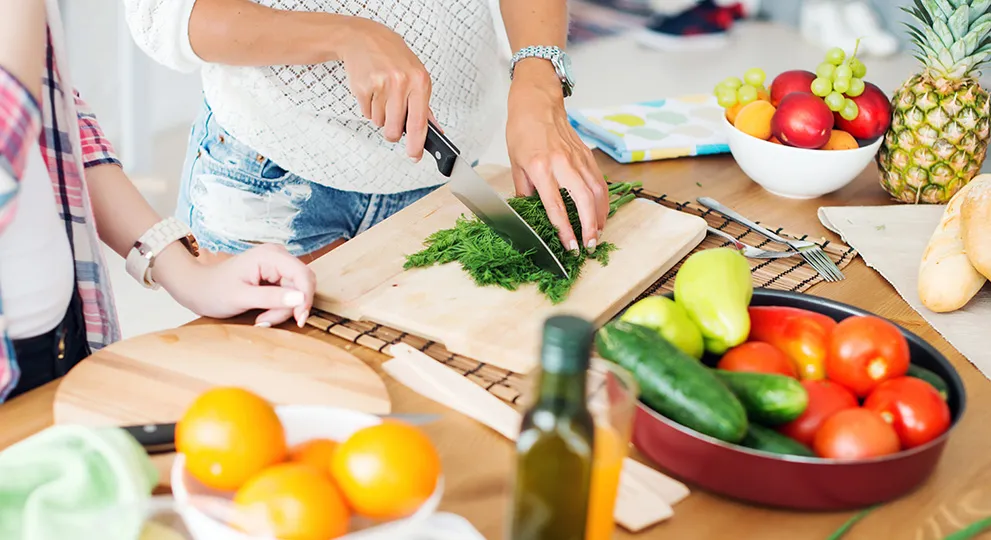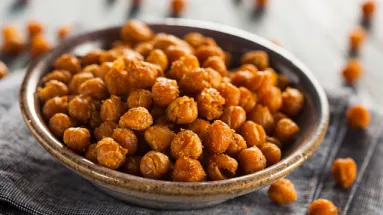How dietary needs change throughout cancer treatment
How dietary needs change
throughout cancer treatment
throughout cancer treatment

When thinking about what constitutes a healthy diet, most people have images of fresh salads, high fiber grains, modest amounts of healthy fats and consuming less sugar. Those going through cancer treatment may be encouraged to follow dietary practices different from what they might have been told before cancer treatment. This includes the need to focus on consuming more calorie dense foods in an effort to provide the largest amount of calories without having to eat much, in cases of low appetite, to make sure patients maintain weight during treatment.
Melissa Rifkin, a registered dietitian, shares how nutritional needs and eating strategies may look different leading up to, during, and after treatment of cancer.
Nutritional needs before treatment
It is important to go into treatment as healthy as possible. This means following a diet rich in a variety of foods such as lean protein, healthy fats, complex carbohydrates and plenty of produce along the way. It is hard to know what eating issues may arise during treatment, so try to eat as normally as possible and aim to maintain your weight by eating a healthy diet prior to beginning cancer treatment. Take time to stock your pantry and refrigerator with to-go snack items and precooked meals to make life easier. Create a grocery list your loved ones can use to help with grocery runs during treatment.
Nutritional needs during treatment
Treatment may feel a little different each day. As appetite can fluctuate, it is important to maintain calorie and protein intake to support your body and avoid excessive weight loss that can further compromise your immune system. When you have a healthy appetite, load up on calories, aiming for nutrient-dense foods. Calorie dense foods that also contain protein can be helpful for maintaining weight. Some examples are:
- Peanut butter
- Eggs
- Roasted nuts
- Protein powder
Treatment may also make you more prone to infection, so it is important to use proper food-handling skills to reduce your risk of foodborne illness:
- Wash your hands, utensils and countertops frequently
- Avoid raw or undercooked protein
- Wash all produce thoroughly, even those with a non-edible peel, like melon, bananas and avocados, and ensure you do not cross contaminate with any raw meat
- Designate one cutting board for proteins and another for fruits and vegetables
Nutrition needs after treatment
Once your treatment plan is completed, it is reasonable to expect most eating issues to improve, and eating a healthy diet can make you stronger, help you maintain your weight and help you fight infection. Try your best to:
- Eat a wide variety of foods to ensure broad nutrient intake of (or with) the necessary vitamins and minerals
- Limit processed items with added salt, artificial ingredients, sodium nitrite and unfamiliar ingredient names
- Limit alcohol and choose beverages with no added sugar or artificial sweeteners. Use fresh fruit or herbs, like mint, to add flavor and additional nutrients
- Eat plenty of fruits and vegetables, raw or cooked, to pack in vitamins, minerals and fiber
No matter what eating issues may arise before, during or after treatment, we hope these tips, along with information from your personal physician and dietitian, can help make the challenging times a little easier.
The information contained herein is provided for educational purposes only and is not intended to replace discussions with a healthcare provider. All decisions regarding patient care should be made with a healthcare provider.
Melissa Rifkin, MS, RD, CDN, is a registered dietitian from New York City where she has spent the last 10+ years working in oncology, surgery, and bariatrics. She holds a bachelor’s degree in dietetics and a master’s degree in clinical nutrition. Melissa enjoys sharing her knowledge of nutrition and overall well-being through her Instagram account (@confessionofadietitian).













